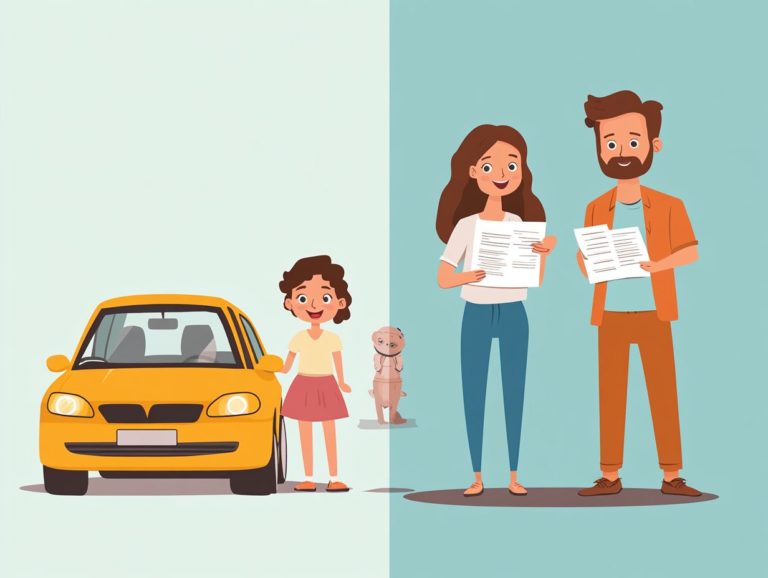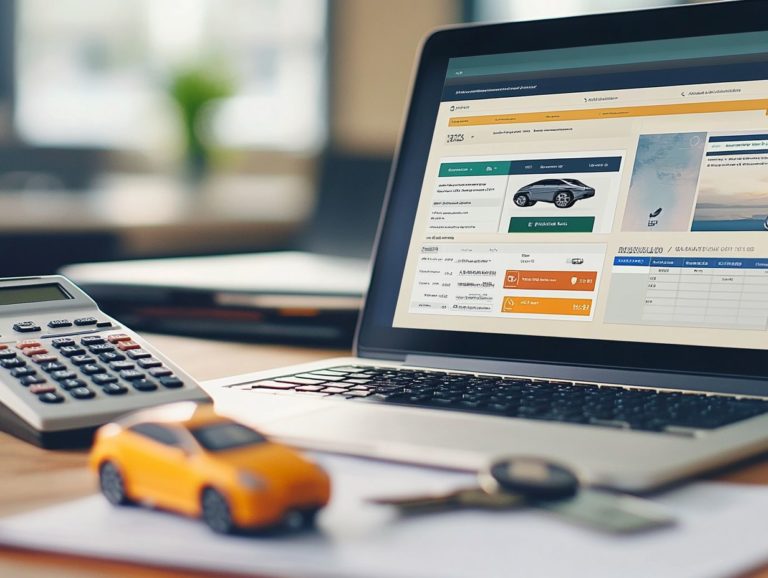5 Steps to Getting Pre-Approved for a Car Loan
Considering the purchase of a new car? Before you step foot in the dealership, obtaining pre-approval for a car loan can save you both time and money.
This guide explains why pre-approval is crucial. It outlines five essential steps to secure your pre-approval, guiding you from checking your credit score to gathering the necessary documents and exploring various lenders.
It also offers tips on enhancing your chances of acceptance. Are you ready to drive away in your dream car today? Let s dive in!
Contents
Key Takeaways:
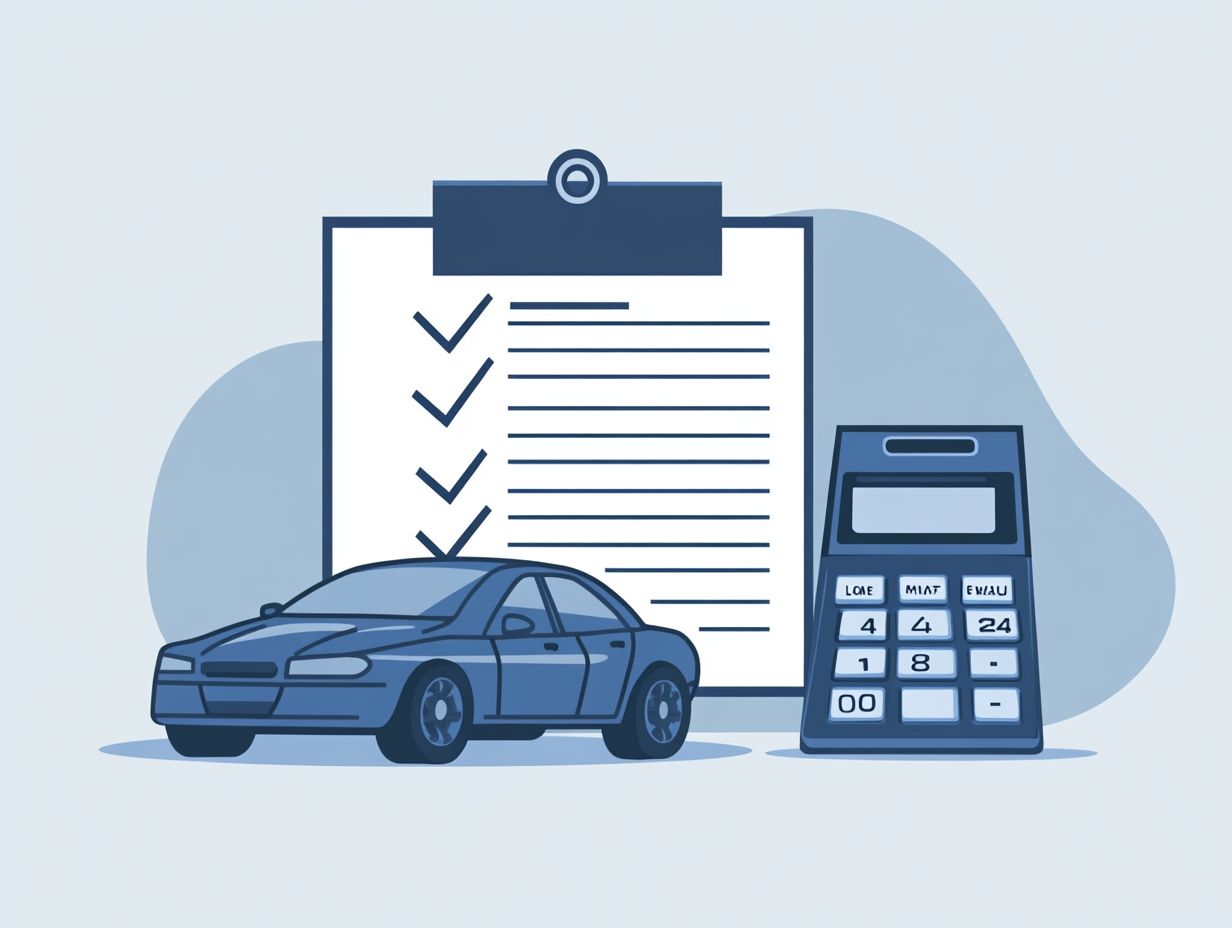
- Check your credit score to secure the best rates.
- Calculate your budget and plan your down payment.
- Gather key documents for a smooth application.
- Compare lenders for the best deal.
- Submit your application and wait for approval.
1. Check Your Credit Score
Before diving into a car loan application, it s essential for you to check your credit score, as it significantly influences your eligibility and the loan terms that various lenders, such as credit unions and banks, will offer.
A robust credit score not only boosts your chances of approval but also opens the door to more favorable interest rates. This ultimately impacts your monthly payments over the life of the loan.
By understanding your credit report, you can address any discrepancies and enhance your prospects of securing attractive financing options for your vehicle purchase. Knowing your credit score is essential, as it serves as a financial snapshot that lenders rely on to assess risk.
It s wise to obtain a free credit report from reputable sources, giving you the opportunity to review your personal information, account history, and any outstanding debts.
Common Factors Affecting Your Credit Score:
- Payment history
- How much credit you’re using compared to your total credit limit
- The length of your credit history
A high credit score leads to lower interest rates on your car loan, providing significant financial advantages in the long run. By monitoring your credit health, you enable yourself to negotiate better loan conditions, transforming the car-buying experience into a more rewarding venture.
2. Calculate Your Budget and Determine Your Down Payment
Calculating your budget and determining an appropriate down payment are crucial steps in the car loan process. These steps lay the groundwork for your monthly payments and overall financing strategy.
Establishing a realistic budget allows you to assess how much you can genuinely afford, taking into account your total income and the amount of debt you have compared to your income.
Opting for a larger down payment can significantly reduce your loan amount, leading to lower monthly payments and more favorable interest rates. Beyond the purchase price of the car, it s essential to consider additional costs like insurance premiums, sales taxes, and ongoing maintenance expenses.
These factors can greatly influence the total cost of ownership and should be integrated into your budgeting process. To effectively save for a down payment, think about setting aside a specific percentage of your monthly income or exploring the idea of a dedicated savings account.
A substantial down payment not only helps you secure favorable loan terms but also decreases overall debt. This results in manageable monthly payments that align seamlessly with your financial goals.
3. Gather Necessary Documents
Gathering the necessary documents is a crucial step in your car loan application process. Lenders need specific financial information to assess your eligibility and finalize your loan offer.
Essential documents typically include recent bank statements, tax returns, and personal details such as your Social Security number and employment information. By being well-prepared with these documents, you smooth the application process and enhance your credibility with potential lenders.
Here s a quick checklist of documents you might need:
- Proof of insurance
- A valid driver s license
- Any additional income verification, like pay stubs or profit and loss statements if you’re self-employed
Organizing these documents methodically perhaps in a designated folder or digital file can save you time and reduce stress. Providing a strong credit history and references can further bolster your request, showcasing your reliability and ability to make timely payments.
By presenting a clear and complete application, you significantly increase your chances of securing favorable loan terms.
4. Shop Around for Lenders
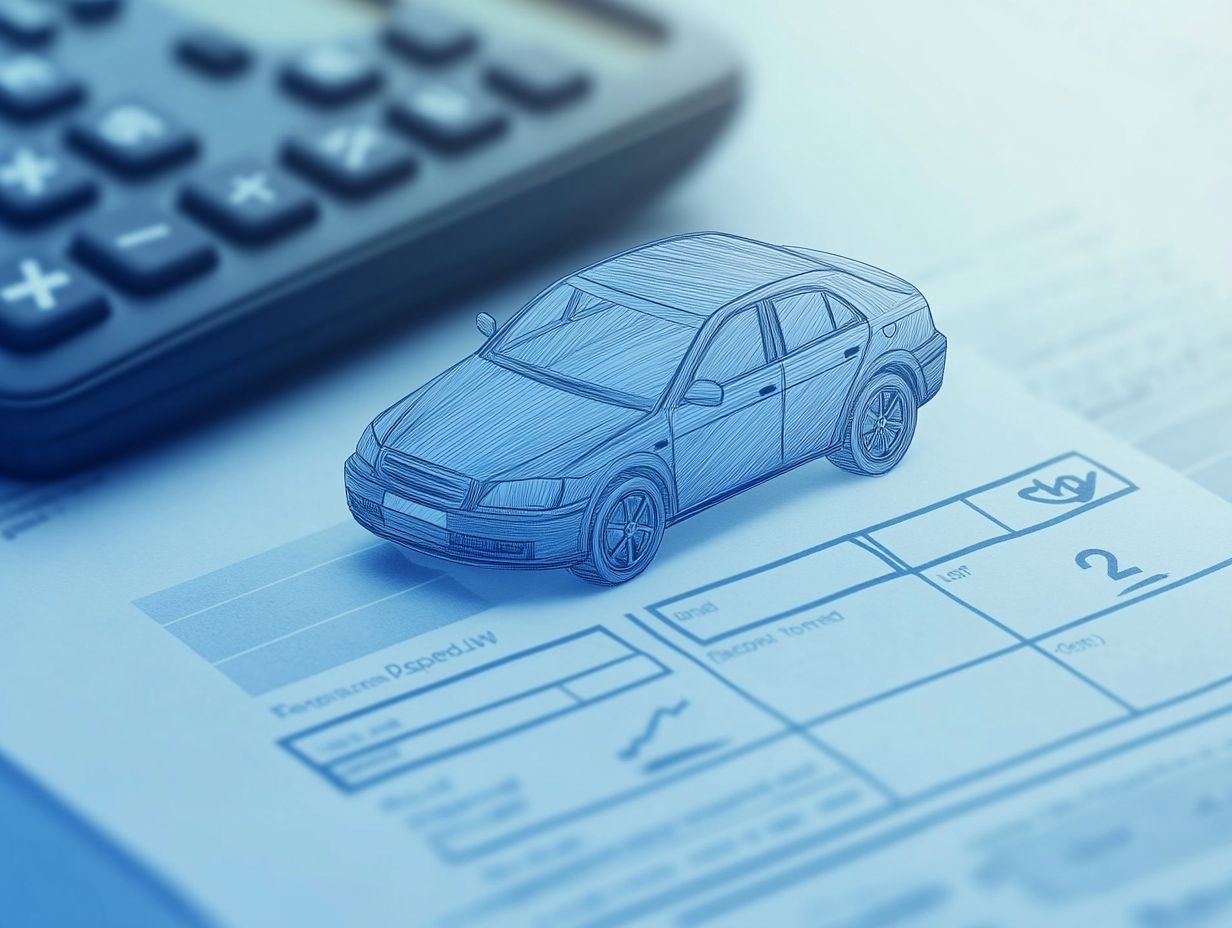
Shopping around for lenders is crucial to discovering the auto loan that perfectly aligns with your financial needs and goals. Different lenders credit unions, banks, or online lenders offer various loan terms and interest rates.
By comparing these offers, you arm yourself with insights necessary to negotiate better terms, enhancing your negotiating power. This diligent approach ensures you secure not just a competitive interest rate, but also a loan amount that fits comfortably within your budget.
Start by researching multiple lenders through their websites and exploring their product offerings. Pay particular attention to interest rates; even a slight variation can significantly impact the total amount you repay. Consider the length of the loan terms as well; a longer term may reduce your monthly payments, but it could also inflate the total interest you pay over time.
Customer reviews provide valuable insights into the quality of service and any potential hidden fees. Keep in mind that credit unions often offer lower rates but may require membership, while online lenders might deliver quick approvals without in-person support.
Armed with this information, you’ll make a well-informed decision and gain leverage in negotiations, allowing you to advocate for better conditions based on your comprehensive research.
5. Submit Your Application and Wait for Approval
Once you ve gathered your documents and selected a lender, submitting your loan application becomes the next pivotal step in the car loan journey, kickstarting the approval process that could lead to conditional approval.
During this application phase, you ll need to share your finances to get the best deal, including personal information, income sources, and specifics about the vehicle. Lenders will assess this information to gauge your eligibility for a loan. Understanding this process helps you set realistic expectations regarding approval timelines and potential outcomes.
You have the option to submit your application online, which often results in a faster response time due to the efficiency of digital processes. Alternatively, visiting a lender s branch in person can provide the advantage of asking questions directly, offering you greater clarity on the requirements.
Keep in mind that once you submit your application, the approval process typically requires the lender to review your credit history and overall financial health. This review can take anywhere from a few hours to several days, depending on the lender s specific protocols. Be prepared to provide additional documentation if requested, which may include:
- Proof of income
- Identification
- Details of the vehicle you intend to purchase
Being ready for these requests can significantly expedite your approval timeline.
Being well-prepared can speed up your approval!
Start gathering your documents today to get your car loan process rolling!
What Is a Pre-Approved Car Loan and Why Is It Important?
A pre-approved car loan lets you understand how much you can borrow before you start shopping for a vehicle. Lenders assess how reliable you are in paying back loans and provide a conditional offer, giving you insight into potential loan terms and amounts.
This step is invaluable. It equips you with knowledge about your financial limits and boosts your negotiating power at the dealership. Understanding the 5 steps to successful car negotiation can further enhance your confidence as you shop for cars, fully aware of your budget and the interest rates you might qualify for from various lenders.
Pre-approval is a game-changer compared to pre-qualification. While pre-qualification offers a rough estimate of loan terms based on limited information, pre-approval involves a comprehensive review of your credit history, resulting in a more precise assessment by the lender.
The advantages for you as a borrower are noteworthy. Obtaining pre-approval enhances your confidence and simplifies the entire car-buying process. It ensures that negotiations are based on a well-defined financial framework.
Don t miss out! Understanding your pre-approval terms is key to securing the best deal. Be clear on fees, repayment schedules, and interest rates, as these factors can significantly impact your long-term financial stability.
What Are the Benefits of Getting Pre-Approved for a Car Loan?
Getting pre-approved for a car loan comes with many advantages that can enhance your buying experience. You gain access to the best rates available and strengthen your negotiating power when it’s time to buy your vehicle. To make the most informed decision, consider the 5 things to look for in new car financing options.
Walking into the dealership with pre-approval means you re armed with crucial knowledge about your financing options. This enables you to make informed decisions and negotiate better loan terms.
Pre-approval simplifies your car shopping journey by providing a clear budget and a solid understanding of your borrowing limits. This clarity not only brings peace of mind but also fosters confidence in your purchasing decisions.
Many buyers find that pre-approved rates are significantly lower than what dealerships offer, leading to considerable savings over the life of the loan. Having pre-approval speeds up the transaction process, minimizing paperwork and reducing wait times at the dealership.
In essence, pre-approval doesn t just streamline your car-buying experience; it helps you make choices that align perfectly with your financial situation.
What Are the Possible Reasons for Rejection?
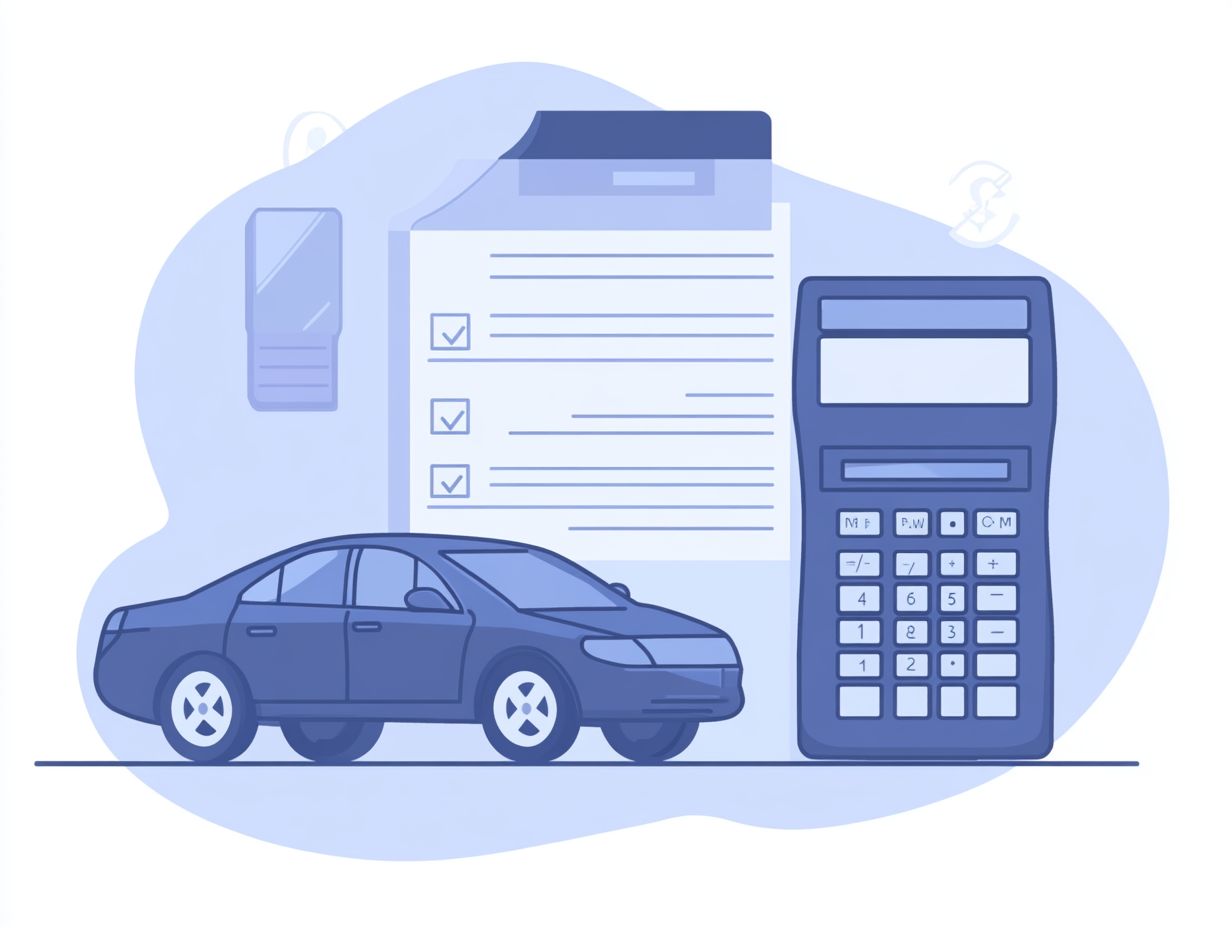
Loan rejection can happen for various reasons. Common issues include a low credit score, insufficient financial documents, or not meeting specific lender requirements. By understanding these potential pitfalls, you can tackle issues proactively before applying for a car loan, significantly boosting your chances of approval.
Addressing discrepancies in your credit report and ensuring you have all the necessary financial documents can enhance your application s success rate dramatically.
Maintaining a healthy credit score is essential, as lenders view it as a reflection of your financial reliability. Regularly checking your credit report for errors or outdated information gives you a chance to fix mistakes that could harm your score.
When you prepare organized financial documents like proof of income, bank statements, and employment verification you create a positive impression with lenders.
By demonstrating financial stability and readiness, you strengthen your position and reduce the likelihood of rejection. Prioritizing these strategies not only smooths the borrowing process but also enables you to make informed financial decisions.
How Can You Improve Your Chances of Getting Pre-Approved?
Improving your chances of getting pre-approved for a car loan involves a series of strategic steps that can significantly enhance your position. Start by reviewing your credit report and addressing any discrepancies you encounter. This proactive approach helps you get better results.
Managing the amount of debt you have compared to your income is equally important, as it reflects your financial stability to potential lenders. Ensuring your credit score is in good standing and providing complete, accurate financial documents will undoubtedly bolster your appeal during the pre-approval process.
Demonstrating a reliable income source adds another layer of attractiveness to your application. To maximize these efforts, check your credit report for errors and dispute any inaccuracies you discover ideally, several months before you apply.
Keeping your credit card balances low will help your credit utilization ratio. Aim to pay down any outstanding debts to alleviate your overall debt load, which is crucial for assessing your financial health.
Gather necessary documentation, such as proof of income, tax returns, and details about your assets well in advance. This will ensure a smoother application process, enabling you to tackle any unforeseen issues promptly.
What Are the Differences Between Pre-Approval and Pre-Qualification?
Understanding the distinctions between pre-approval and pre-qualification is essential for borrowers navigating the car loan landscape. Each serves its own purpose and involves different levels of lender assessment.
Pre-qualification gives you a quick estimate of how much you might be eligible to borrow based on your self-reported financial information. In contrast, pre-approval involves a detailed examination of your credit report and financial documents, resulting in a more definitive loan offer.
Grasping these differences enables you to make informed choices throughout your vehicle purchase journey. While pre-qualification is often a straightforward and rapid step that enables you to assess your borrowing capacity without a hard inquiry on your credit report, it doesn’t guarantee loan approval.
Getting pre-approval can strengthen your negotiating power with dealerships and sellers, signaling a serious intent to secure financing. Depending on your unique financial situation, including credit scores and income stability, you may want to pursue pre-approval if you’re ready for a substantial purchase and wish to take advantage of potentially lower interest rates.
What Should You Do After Getting Pre-Approved?
After securing pre-approval for your car loan, take these exciting 5 steps to prepare for buying a new car to maximize the benefits of your financing offer and ensure a successful vehicle purchase.
Start by reviewing the loan offers. Pay close attention to interest rates, loan terms, and potential monthly payments, all while aligning them with your established budget. This proactive approach keeps you within your financial limits and boosts your confidence as you embark on your car shopping journey, knowing exactly what you can afford.
Once you’ve evaluated the loan offers, reassess your budget. This will give you a clear understanding of how much you can allocate to ongoing monthly costs.
Next, gear up for negotiations with dealers by researching fair market prices for your desired vehicle. This research will equip you during discussions, ensuring you re not caught off guard.
Throughout this process, maintaining open communication with your lenders is critical. Regular updates can prevent any last-minute hiccups and ensure you have all necessary paperwork at your fingertips.
Finally, keeping your financial documents organized will streamline the process as you finalize your loan and prepare for that exciting purchase.
Frequently Asked Questions
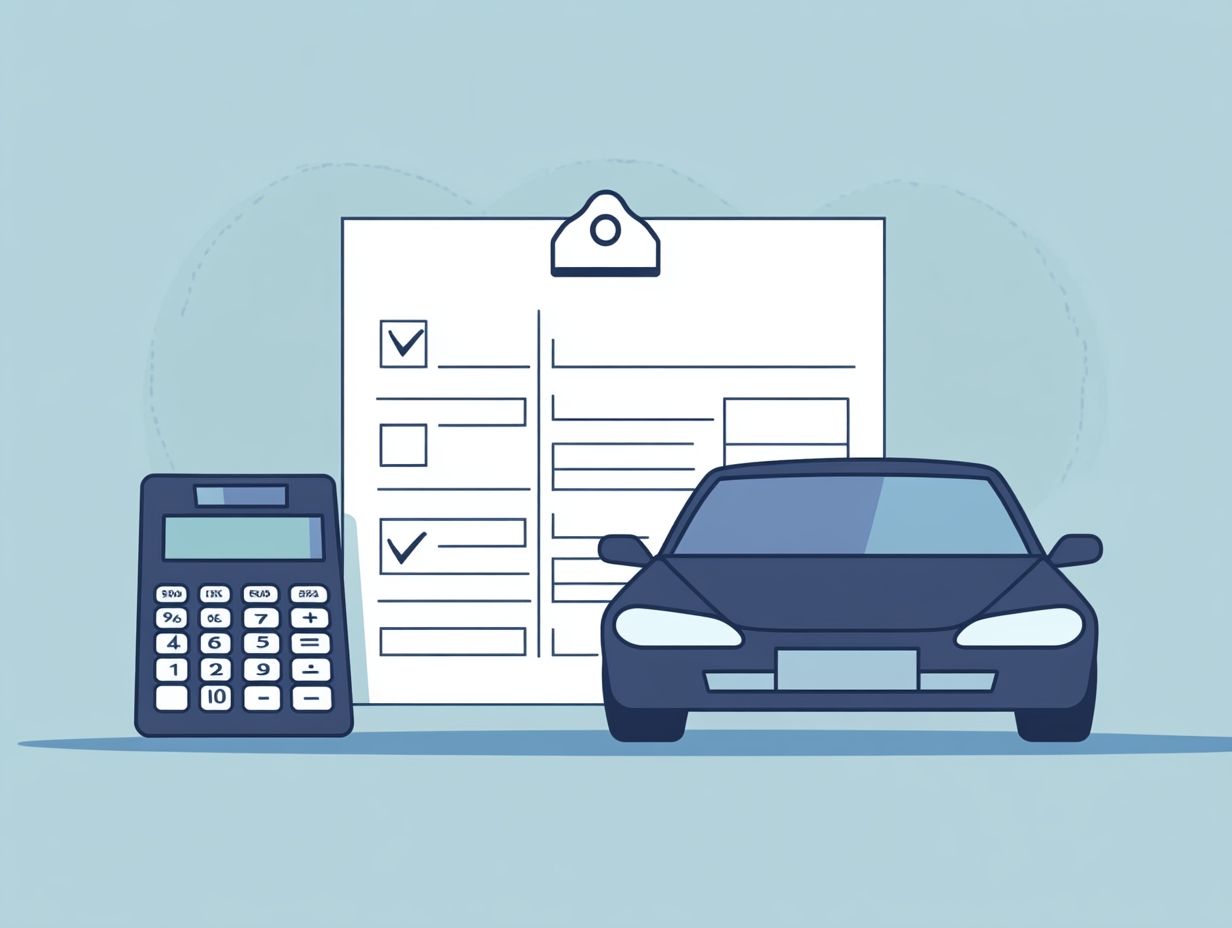
What are the 5 steps to getting pre-approved for a car loan?
The 5 steps to take before financing a car are: gathering financial documents, checking your credit score, determining your budget, shopping around for lenders, and submitting a loan application.
Ready to get started? Follow these steps now!
Why Get Pre-Approved for a Car Loan?
Getting pre-approved for a car loan helps you know what you can afford. It also aids in negotiating with dealers, saving you both time and money.
What Documents Do I Need for Pre-Approval?
Gather your pay stubs, bank statements, and tax returns from the last two years. You might also need proof of where you live and work.
How Does My Credit Score Impact Pre-Approval?
Your credit score is key to your loan’s interest rate and terms. A higher score boosts your chances of getting better rates.
Can I Get Pre-Approved with Bad Credit?
Yes, you can still get pre-approved with bad credit. Be prepared for higher interest rates, and you may need a co-signer or more documents.
How Long Does Pre-Approval Take?
The time it takes can vary by lender and your financial situation. Generally, expect to wait a few business days to a week for a decision.


